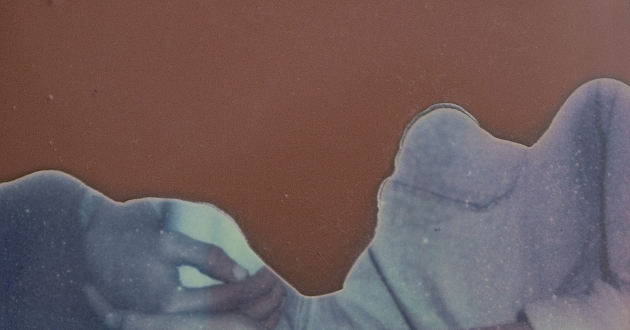
>> It was The Loft and The Weather Prophets, more than any other single Creation Records band, that were responsible for turning this reviewer on to the wealth of great material that arrived via the imprint prior to My Bloody Valentine's revolutionary 1987 EP You Made Me Realise. The earnest and driven jangle of songs like "Up The Hill And Down The Slope" and "Almost Prayed" combined the clean drive of The Velvet Underground circa their self-titled 1969 third album with a homespun, plainspoken honesty that felt both welcoming and timeless. When we received word that Slumberland Records would release a solo album by Pete Astor, the fronter of the aforementioned Loft and Weather Prophets, we were sold right away. Called Spilt Milk and due on white vinyl Feb. 12, Mr. Astor's latest is a ten-song set that illustrates his firm command over the style and feel that made his early work so charming. Produced in part with James Hoare of cherished contemporary hitmakers Veronica Falls, Ultimate Painting and Proper Ornaments at Mr. Hoare's London-based home studio, Spilt Milk's music offers a similar warm and classic pop essence, one that hugs the listener like the trustiest worn cardigan. The record's first preview single "Really Something" immediately assures listeners that Astor's songwriting prowess remains honed; here and there his subtle, delicate throat croaks and cracks, conveying to each verse lyric some significant weight, before a deceptive chorus swoops in. The second preview taster for the LP, the ode to onanism "My Right Hand," incorporates VU-styled boogie alongside all manner of historical and cultural references to weave a complex yet exceedingly pleasant love song that passes by so briskly it begs for multiple, smiling repeats. We have heard the rest of the album, which is dynamite, and our assessment is that Spilt Milk makes a strong case for the best kind of later-life artistic statement. While Hoare's playing is all over the record -- he laid down guitar, bass, drums, keyboards and backing vocal tracks on the set -- and other players include legends Pam Berry (Black Tambourine) and Jack Hayter (Hefner) among others, the record never forgets the building blocks upon which Astor's legacy is founded, and not only celebrates them, but also has fun on its own terms, too. Stream the aforementioned "Really Something" and "My Right Hand" via the embeds below, and pre-order the album from Slumberland right here. Note that the set is a co-release with Fortuna Pop, which will issue Spilt Milk across the proverbial pond a day prior. -- Edward Charlton
>> This reviewer thought himself familiar with all of the deepest voices in rock. To be sure, since the the late '70s post-punk wave that lifted up the distinctively down-tuned larynxes of Ian Curtis, Robert Smith, Ian McCulloch and Morrissey, there has been a wealth of dark crooners at work in the genre. But, outside of perhaps the death metal scene (and setting aside the masterful grandfather of them all, Scott Walker), no voice has been as strikingly bottomless in recent memory as that of the singer of shadowy London dream-pop concern Black Seas. The mysterious ensemble, which largely eschews most online social media and whose only member we can prove exists is a fellow named Stav who once corresponded with Clicky Clicky, released late last year at long last a stirring self-titled debut EP. The six-song release follows -- after a lengthy pause -- a series of excellent digital one-offs, some of which it contains. Black Seas commences with the highlight "Laurie," which balances the kind of seasick tremolo abuse inspired by Loveless with the gloomy, violent and abstract sexuality of Xiu Xiu. The song is a slinky wonder, opening with a rolling drum beat before the brackish singing presents front and center with literate and colorful lyrics that raise more questions than answers. "There will be sentries in the shadows," the singer warns. While this sound has served well fellow Brits The Horrors -- especially on their Geoff Barrow-produced Primary Colours -- Black Seas opt to inhabit and intellectualize their frigid dystopia rather than aim for the arena rock rafters at every available moment. Its an ideal environment that fully bears the weight of a leaden voice. No less affecting the band's menacing eponymous track, a version of which we played during a New Music Night three years ago. Surprisingly perky bass playing underpins vast scraping guitar chords, while the singer stirringly emotes. The EP takes a turn for the more pop and upbeat with "Golden Child," although Black Seas employs the same building blocks to get where it needs to go. Clicky Clicky is very hopeful the appearance of this EP is a sign that the act will become a more active concern in 2016, as its music is terrifically compelling. Stream Black Seas via the SoundCloud embed below. -- Edward Charlton
>> Your Friend -- not to be confused, of course, with Alexei Berrow's similarly terrific solo project Yr Friends -- is the brainchild of Kansas-based songwriter Taryn Miller, and her early work garnered sidelong notice in these electronic pages (or at least our Facebook page), but we now have occasion for a more thorough examination: the debut Your Friend long-player Gumption, which arrives at the end of the month. The first preview track from the collection is "Heathering," which gently sways, brightly sparkles and lushly drones under Ms. Miller's rich, searching vocal. Videos of Miller performing live a year or two back impressed because of her ability to build up layers of loops to create compelling compositions as a solo performer. While she continues to occasionally perform solo, "Heathering" feels free from any constraints whatsoever. Gumption was recorded at the Rare Book Room in Brooklyn with studio founder and producer Nicolas Vernhes, who has also worked with Animal Collective, Deerhunter and The War On Drugs. The album is due Jan. 29 on vinyl 12", CD and as a digital download. Pre-order the set right here, and stream the aforementioned "Heathering" via the SoundCloud embed below. Your Friend plays the Middle East Downstairs April 12 as part of a big-ass spring tour, supporting Alex G and Porches; we implore you to make a note to arrive early to see Your Friend, because that's the smart move. Your Friend's Domino debut, a self-recorded EP titled Jekyll/Hyde, was released in early 2014.

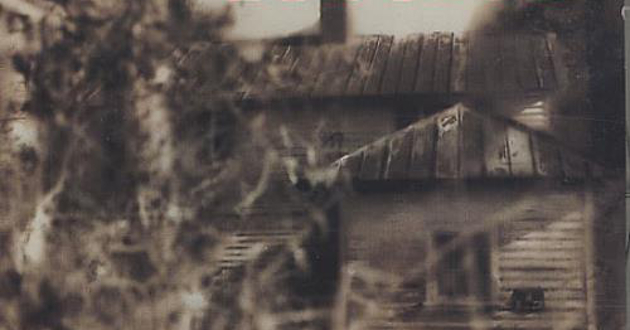
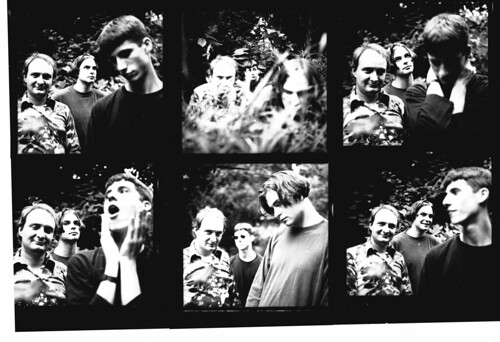 Opener
Opener 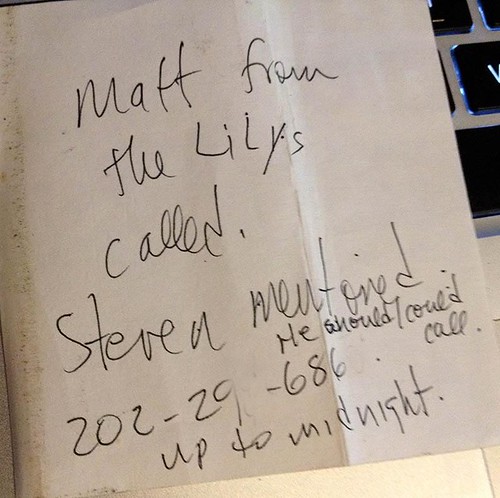 Matthew Dingee (guitarist/vocalist): I guess I shouldn't be shocked that Davis has this note. He and Stephen are excellent documentarians. I will say I was definitely formerly of
Matthew Dingee (guitarist/vocalist): I guess I shouldn't be shocked that Davis has this note. He and Stephen are excellent documentarians. I will say I was definitely formerly of 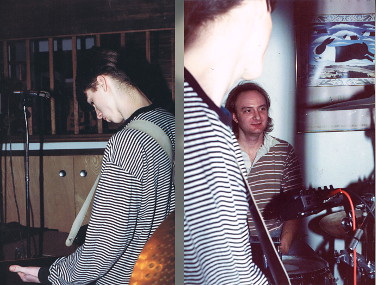 Lorelei as a three-piece didn't start off too far afield from Lilys, though much less refined. We played with bands on other local labels and enjoyed that. But fitting in was the last thing I wanted to do. To Mike's credit, he didn't seem to worry too much about whether the roster fit together. He put out records by the bands he liked. He just happens to have inscrutable taste and so it all fits together in the end. For example, despite the fact that we sound nothing like Small Factory, I'd go completely mental when they played. They were so good and played with such enthusiasm. I wanted to do that.
Lorelei as a three-piece didn't start off too far afield from Lilys, though much less refined. We played with bands on other local labels and enjoyed that. But fitting in was the last thing I wanted to do. To Mike's credit, he didn't seem to worry too much about whether the roster fit together. He put out records by the bands he liked. He just happens to have inscrutable taste and so it all fits together in the end. For example, despite the fact that we sound nothing like Small Factory, I'd go completely mental when they played. They were so good and played with such enthusiasm. I wanted to do that.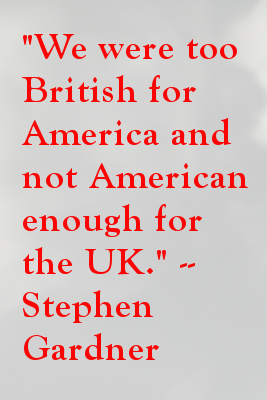 CC: How would you describe the progression that the group saw between the "Bitter Air" 7", "Mimesis" from the ...One Last Kiss comp, the Asleep EP and then the full-length?
CC: How would you describe the progression that the group saw between the "Bitter Air" 7", "Mimesis" from the ...One Last Kiss comp, the Asleep EP and then the full-length?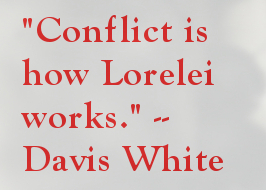 CC: What was it like recording with Geoff?
CC: What was it like recording with Geoff?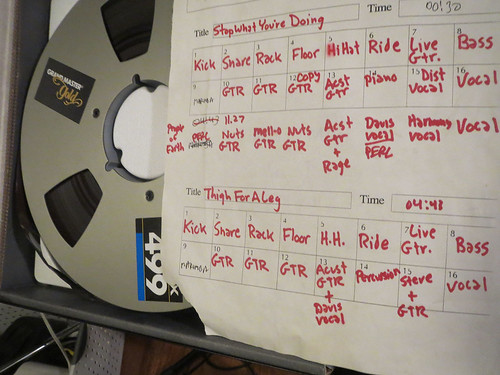 DW: After [our] sobering tour of England for Asleep -- documented in Robert Salsbury's [tour film]
DW: After [our] sobering tour of England for Asleep -- documented in Robert Salsbury's [tour film] 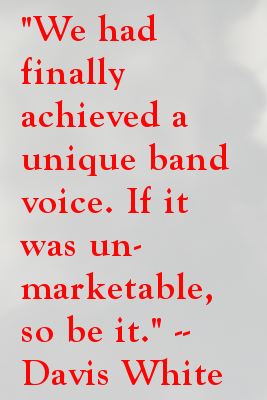 Overdubs were done over the next two weeks. The heavily-layered guitars were tri-amped through a Danelectro 3x10 combo, Acoustic 4x12, and Fender Bassman, live-mixed to one track. Looking at the tracking sheet, we had 4-7 tracks reserved for guitar out of the 16 available tracks on the ADATs. The unusual instruments [borrowed] from the Woodlawn [school] instrument room for this session included a double bass, some tuned woodblocks, conga drum and the Gardner family piano. Through a fortunate error, a cheesy orchestral percussion track on "Crimelab" did not get transferred to the 24-track mixing tape at Avalon.
Overdubs were done over the next two weeks. The heavily-layered guitars were tri-amped through a Danelectro 3x10 combo, Acoustic 4x12, and Fender Bassman, live-mixed to one track. Looking at the tracking sheet, we had 4-7 tracks reserved for guitar out of the 16 available tracks on the ADATs. The unusual instruments [borrowed] from the Woodlawn [school] instrument room for this session included a double bass, some tuned woodblocks, conga drum and the Gardner family piano. Through a fortunate error, a cheesy orchestral percussion track on "Crimelab" did not get transferred to the 24-track mixing tape at Avalon.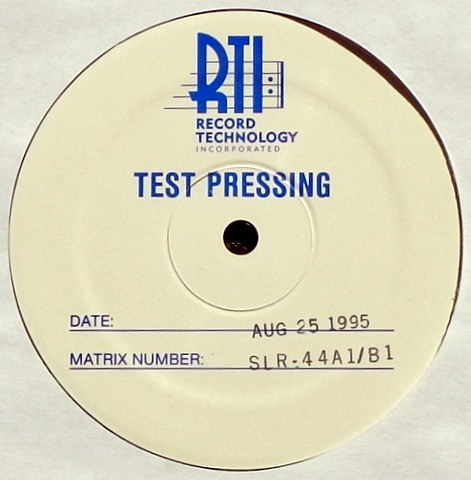 Matt would go out into the studio, actually I believe we sent him into the tiny studio restroom, to record these crazy emo-fueled shrieking freakouts, like cathartic vocal outbursts. These were overdubs and were mixed in low during the parts of the songs when the guitars detonated your speakers. I can't remember which songs had these screaming tracks, but on re-listening I'm imagining that I'm hearing them on every song all over the album, which is cool.
Matt would go out into the studio, actually I believe we sent him into the tiny studio restroom, to record these crazy emo-fueled shrieking freakouts, like cathartic vocal outbursts. These were overdubs and were mixed in low during the parts of the songs when the guitars detonated your speakers. I can't remember which songs had these screaming tracks, but on re-listening I'm imagining that I'm hearing them on every song all over the album, which is cool.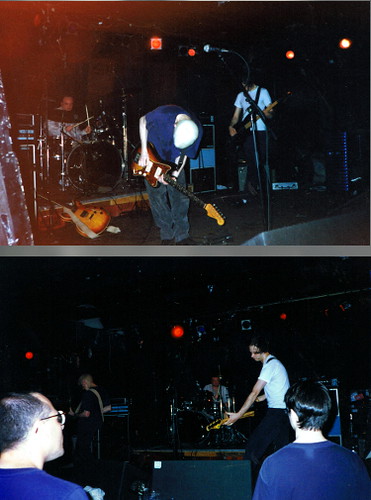 DW: Geoff and the band would ponder each of the 16 instrument tracks with a "what can we do to this" attitude. Sometimes, one simple change, such as "Crimelab's" distorted conga drum that Geoff came up with, would redefine the song. This would influence the next effect, and the one after that, until we ran out of patches. The bass guitar was spared any tinkering and had a simple chain throughout. It was recorded direct, then run through a Peavey tube preamp during the mix. Stephen didn't yet have his amazing Acoustic 360 bass "refrigerator" for much of the recording of the album, unfortunately.
DW: Geoff and the band would ponder each of the 16 instrument tracks with a "what can we do to this" attitude. Sometimes, one simple change, such as "Crimelab's" distorted conga drum that Geoff came up with, would redefine the song. This would influence the next effect, and the one after that, until we ran out of patches. The bass guitar was spared any tinkering and had a simple chain throughout. It was recorded direct, then run through a Peavey tube preamp during the mix. Stephen didn't yet have his amazing Acoustic 360 bass "refrigerator" for much of the recording of the album, unfortunately.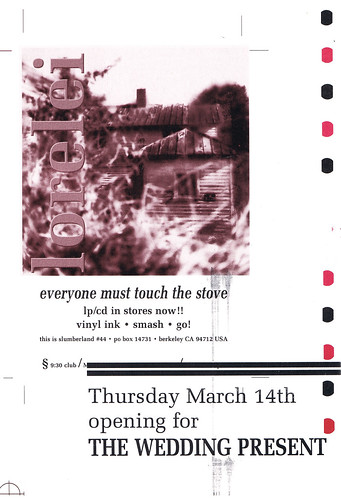 SG: We played several shows that summer and fall of 1995 and into the winter with the release of the LP, for which we had a single record-release show in D.C., being pretty sick of the songs by then since they were all more than a year old. We had written a new batch of songs during the summer of '95, most of which we recorded then but didn't mix until 2001, long after we had disbanded. Our last show was in early 1996 in Baltimore at a strip club that had occasional shows. One of my best Lorelei memories was of Matt taking a running leap, guitar-first, into the stripper'’s pole, with the pole working like a giant slide against the fret board. With me back in school in Massachusetts, everyone with new projects, and us with an LP we felt proud of but that failed to register with nearly anyone, it seemed pretty obvious that the time had come to pack it up. Luckily, the end was not acrimonious and, despite lots of challenges between us, I think we all left the band as friends, feeling like we had accomplished something important and with our respect and admiration for each other intact. This was obviously essential to our later work together.
SG: We played several shows that summer and fall of 1995 and into the winter with the release of the LP, for which we had a single record-release show in D.C., being pretty sick of the songs by then since they were all more than a year old. We had written a new batch of songs during the summer of '95, most of which we recorded then but didn't mix until 2001, long after we had disbanded. Our last show was in early 1996 in Baltimore at a strip club that had occasional shows. One of my best Lorelei memories was of Matt taking a running leap, guitar-first, into the stripper'’s pole, with the pole working like a giant slide against the fret board. With me back in school in Massachusetts, everyone with new projects, and us with an LP we felt proud of but that failed to register with nearly anyone, it seemed pretty obvious that the time had come to pack it up. Luckily, the end was not acrimonious and, despite lots of challenges between us, I think we all left the band as friends, feeling like we had accomplished something important and with our respect and admiration for each other intact. This was obviously essential to our later work together.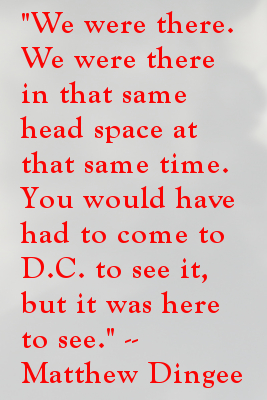 CC: One of my favorite music articles is Nitsuh Abebe's Pitchfork piece
CC: One of my favorite music articles is Nitsuh Abebe's Pitchfork piece 

